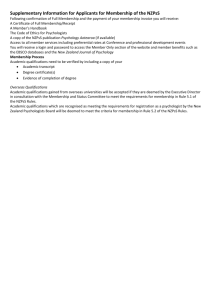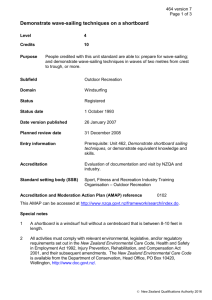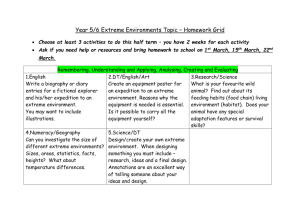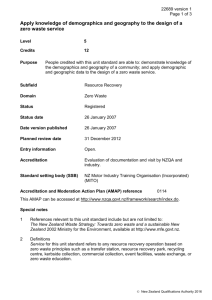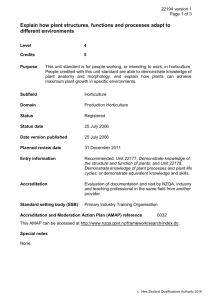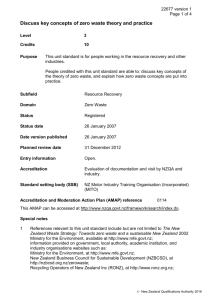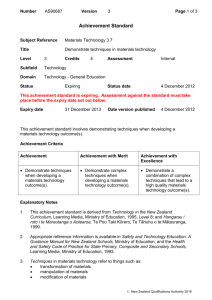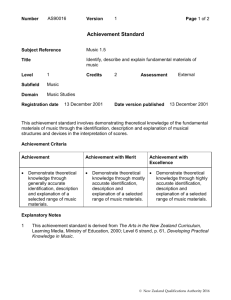14219 Instruct in technical mountaineering skills
advertisement
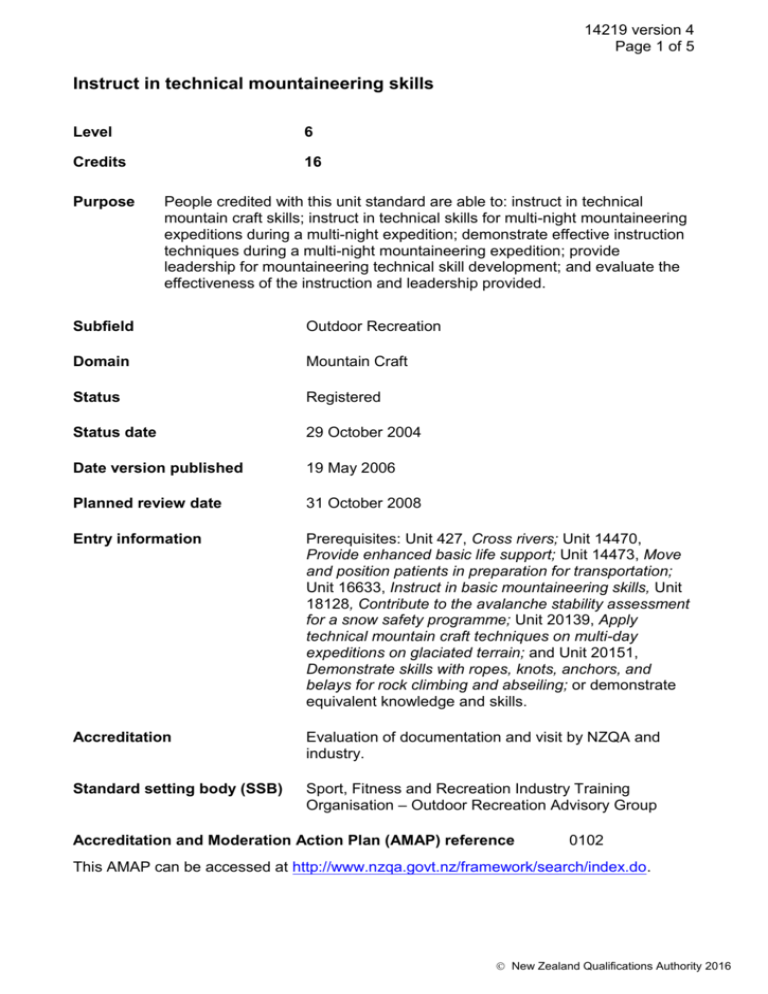
14219 version 4 Page 1 of 5 Instruct in technical mountaineering skills Level 6 Credits 16 Purpose People credited with this unit standard are able to: instruct in technical mountain craft skills; instruct in technical skills for multi-night mountaineering expeditions during a multi-night expedition; demonstrate effective instruction techniques during a multi-night mountaineering expedition; provide leadership for mountaineering technical skill development; and evaluate the effectiveness of the instruction and leadership provided. Subfield Outdoor Recreation Domain Mountain Craft Status Registered Status date 29 October 2004 Date version published 19 May 2006 Planned review date 31 October 2008 Entry information Prerequisites: Unit 427, Cross rivers; Unit 14470, Provide enhanced basic life support; Unit 14473, Move and position patients in preparation for transportation; Unit 16633, Instruct in basic mountaineering skills, Unit 18128, Contribute to the avalanche stability assessment for a snow safety programme; Unit 20139, Apply technical mountain craft techniques on multi-day expeditions on glaciated terrain; and Unit 20151, Demonstrate skills with ropes, knots, anchors, and belays for rock climbing and abseiling; or demonstrate equivalent knowledge and skills. Accreditation Evaluation of documentation and visit by NZQA and industry. Standard setting body (SSB) Sport, Fitness and Recreation Industry Training Organisation – Outdoor Recreation Advisory Group Accreditation and Moderation Action Plan (AMAP) reference 0102 This AMAP can be accessed at http://www.nzqa.govt.nz/framework/search/index.do. New Zealand Qualifications Authority 2016 14219 version 4 Page 2 of 5 Special notes 1 For assessment purposes, at least three mountaineering trips must be completed on snow, ice, rock and mixed terrain slopes, up to and including a 60 degree angle including glaciated terrain, with technical rock up to but not exceeding Ewbank Grade 12. A multi-night mountaineering expedition involves at least three days and two nights. 2 It is recommended that the candidate has a minimum of 50 days logged personal experience climbing and tramping in an alpine environment under self direction, of which a minimum of five days should be experience as an instructor, before being assessed against this unit standard. When gaining the instructional experience, the candidate is in the role of instructor but has no responsibility for clients, although is responsible for self. 3 The Ewbank (Australian) grading system is an open ended numerical grading system. With this system the grade increases with corresponding increase in climbing difficulty. Logan is an alpine grading system used in New Zealand. Contact the New Zealand Alpine Club for more information: PO Box 786, Christchurch, or http://www.alpineclub.org.nz/. 4 All activities must comply with any relevant environmental, legislative and/or regulatory requirements set out in the New Zealand Environmental Care Code, Health and Safety in Employment Act 1992, Injury Prevention, Rehabilitation, and Compensation Act 2001, and their subsequent amendments. The New Zealand Environmental Care Code is available from the Department of Conservation, Head Office, PO Box 10420, Wellington. 5 There are minimum assessor requirements for assessment against this unit standard. The details of these requirements are available on the Sfrito website http://www.sfrito.org.nz/. Elements and performance criteria Element 1 Instruct in technical mountain craft skills. Performance criteria 1.1 Technical rope and anchor skills instruction is provided enabling climbers to complete a mountain climb of Logan Grade 2 difficulty. Range instruction must include but is not limited to – multiple anchor systems for belaying; abseiling and controlled lowers; multiple selfprotected abseils using an anchor with a back-up; lead climb techniques; self-rescue techniques; use of crampons, ice axe and ice hammer. New Zealand Qualifications Authority 2016 14219 version 4 Page 3 of 5 1.2 Rope skill instruction for travelling on glaciated terrain is given in a simulated environment. Range 1.3 instruction must include but is not limited to – rope techniques for varying types of glaciated terrain, rope handling skills, distances between roped climbers, chest harness use and application. Instruction in crevasse rescue techniques is given in a simulated environment. Range instruction must include but is not limited to – building anchors and escape systems, assisting people out of a simulated crevasse, climbing unassisted out of a simulated crevasse. Element 2 Instruct in technical skills for multi-night mountaineering expeditions during a multi-night expedition. Performance criteria 2.1 Instruction for multi-night mountaineering expedition preparation is given. Range 2.2 Instruction in overnight camping skills is provided. Range 2.3 instruction must include but is not limited to – route selection, clothing, personal equipment, food and drink selection and storage, climbing equipment, hygiene of water options, gear distribution, packing backpacks, safety and emergency equipment requirements. instruction must include but is not limited to – shelter selection (advantages and disadvantages), campsite selection and assessment, environmental impact and care, hygienic and safe camp practises, food preparation, safe cooking, disposal of wastes, living skills, equipment care and maintenance. Instruction in environmental, personal, and group care is provided. Range instruction must include but is not limited to – care for the environment, respecting other team members and their property, personal safety, communication. 2.4 Instruction in identifying and managing expedition risks and hazards is provided. 2.5 Instruction in responding to a simulated emergency situation is provided. Range instruction must include but is not limited to – standard operating procedures; emergency responses that safeguard team members from injury, and equipment from damage. New Zealand Qualifications Authority 2016 14219 version 4 Page 4 of 5 2.6 Instruction in the use and maintenance of mountaineering equipment is provided. Range instruction must include but is not limited to – advantages and limitations; recording equipment use, damage, wear, repair, or retirement; equipment checking, cleaning and storage in accordance with the manufacturer’s guidelines. Element 3 Demonstrate effective instruction techniques during a multi-night mountaineering expedition. Performance criteria 3.1 Instruction skills and techniques are demonstrated that are relevant to the needs of the group and enable them to achieve the skills. Range skills and techniques may include but are not limited to – different teaching styles, teaching progressions, checking for individual understanding after presenting skill progressions, adapting plans to suit needs, responsive to group dynamics, maintaining a positive environment; needs may include but are not limited to – individuals initial skill and understanding, different learning speeds, different learning styles, different communication styles. 3.2 Rapport and/or a learning partnership is effectively established with the climbers. 3.3 Progress of each climber is evaluated and accurate feedback is delivered in a manner that matches the needs and learning styles of each climber. Range may include but is not limited to – constructive, timely, oral, visual. Element 4 Provide leadership for mountaineering technical skill development. Performance criteria 4.1 Leadership is demonstrated that ensures the needs of the group are met and a safe and positive environment is maintained throughout the expedition. Range may include but is not limited to – risk management, navigation, weather interpretation, river crossings, first aid, emergency management, environmental care, group processes, communication, motivation, enthusiasm, role modelling. New Zealand Qualifications Authority 2016 14219 version 4 Page 5 of 5 Element 5 Evaluate the effectiveness of the instruction and leadership provided. Performance criteria 5.1 The plans and objectives are evaluated against actual outcomes and reasons for changes are justified. 5.2 The instructional and leadership components of the mountaineering trip are evaluated for strengths and areas for improvement. Please note Providers must be accredited by the Qualifications Authority, or an inter-institutional body with delegated authority for quality assurance, before they can report credits from assessment against unit standards or deliver courses of study leading to that assessment. Industry Training Organisations must be accredited by the Qualifications Authority before they can register credits from assessment against unit standards. Accredited providers and Industry Training Organisations assessing against unit standards must engage with the moderation system that applies to those standards. Accreditation requirements and an outline of the moderation system that applies to this standard are outlined in the Accreditation and Moderation Action Plan (AMAP). The AMAP also includes useful information about special requirements for organisations wishing to develop education and training programmes, such as minimum qualifications for tutors and assessors, and special resource requirements. Comments on this unit standard Please contact the Sport, Fitness and Recreation Industry Training Organisation info@sfrito.org.nz if you wish to suggest changes to the content of this unit standard. New Zealand Qualifications Authority 2016
